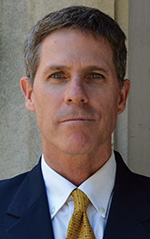Outside Observers See the United States in Ways We Ourselves Cannot
The views of well-informed foreign observers can offer a welcome counterpoint to the extreme ups and downs of Americans’ own assessment of our nation and its role in the world.
BY ALEXIS LUDWIG
In his magisterial biography of George Kennan, John Lewis Gaddis highlights a central irony in the thinking of America’s most illustrious diplomat. As penetrating as Kennan’s insight into Soviet Russia was, he was stunningly myopic and misguided when it came to his own country. He tended to see the United States in the most pessimistic of lights, as unequal to the grave and gathering challenges of the times, a cesspool of corruption and destined for decline.
Kennan was and is not alone. Mistaken self-assessment is a kind of occupational hazard for the human species. For Americans, the self-assessment seems to swing between extremes: we are the nation embodying the special providence of the “City upon a Hill” on one hand, and the nation falling far short of those same high-flying ideals, and hurtling headlong for destruction, on the other. Perhaps these are two sides of the same coin.
Whatever its wellsprings, the collapse and fall of the United States is a recurring theme in the annals of postwar American commentary. I was reminded again of this fact by the focus of this summer’s Foreign Affairs magazine, titled—you guessed it—“What Happened to the American Century?” In this latest chapter in the long-standing chronicle of America’s decline, for example, Fareed Zakaria claims the United States has squandered its unipolar moment; Larry Diamond describes the collapse of the U.S.-led Freedom Agenda; and Dani Rodrick analyzes how globalization undermined American interests. And so on.
As a child of the Cold War, I myself recall the countless news stories in the 1970s and 1980s dedicated to the proposition that the Russians would handily win the running superpower competition. One memorable Time magazine cover from that era captured the mood perfectly. Following yet another bilateral summit agreement in which Soviet negotiators had allegedly bested ours, it featured an oversized drawing of a dramatic superpower handshake—with the grasping hand painted in the colors of the Soviet hammer and sickle while the hand being grasped was rendered in the American red, white and blue. As a pithy letter writer gasped the following week: “Your cover clearly showed that the Russians have got us!”
Fast-forward to the fall of the Berlin Wall and the collapse of the Soviet empire. It wasn’t long before academic analysts like Chalmers Johnson began cawing darkly, “The Cold War is over, and Japan won.” Japan had traded places with the United States, become the new “Number One” and was now set to spread so-called “Pax Nipponica” into the new Asian century. Once again, the United States was cast in the role of a fading power, tired and corrupt, our hollowed-out industry and eroded economic base faltering in the face of the fierce competition from our dynamic new rival and partner, with the erosion of our geopolitical influence sure to follow.
Somehow that scenario, too, failed to come to pass.
Today, it is China’s turn. The rising billion-strong behemoth is often portrayed as being on the verge of pushing aside and displacing a politically distracted and inward-looking “America-first” United States that is once again, of course, sliding down the slippery slope of decline.
The United States is a big, complex, boisterous and imperfect democracy. Its present is therefore always unsatisfactory, and its unfulfilled future always in doubt.
True, the past may not be prelude, and the wolf might actually be roaming hungrily on the hillside among the sheep this time around. But it still seems relevant to ask: What is wrong with this exceedingly gloomy picture? Why does the news of America’s demise always seem so premature, at least in retrospect?
Factors to Consider
I’d like to propose several factors to explain the mistaken self-assessment of American analysts about the future of their own country. I will close with a modest counter-proposal, highlighting the importance of hearing the perspectives of informed outside observers, to balance out our own navel-gazing.
The first factor has to do with the perpetual crisis of democracy. As the Argentine political scientist Guillermo O’Donnell wrote in a brilliant 2007 essay on this topic: “Democracy is and always will be in some kind of crisis, for it is constantly redirecting its citizens’ gaze from a more or less unsatisfactory present toward a future of still unfulfilled possibilities.” Whatever else the United States may be, it is a big, complex, boisterous and imperfect democracy. Its present is therefore always unsatisfactory, and its unfulfilled future always in doubt. So many things have gone awry, and so many others might possibly go wrong!
If the point is not quite clear, this means that the United States has had, now has and always will have many grave shortcomings, faults and problems. It also means that these ever-present problems—this perpetual crisis—will tend to attract the attention of our most thoughtful observers and analysts. Indeed, their—and our—gaze will be constantly redirected there. If we’re lucky, it might also mean that as a result, eventually, our democratic system itself will respond with some kind of solution or solutions, even if not necessarily at the pace one would wish or in the manner one would hope and know would have been better, until the next new round of problems and challenges comes along.
In this reading, the chronicle of perpetual American decline would have the paradoxical effect of helping prevent its own predictions from coming true.
By contrast, autocracies prefer to project false portraits of flawless perfection, even if these portraits are generated by sweeping problems under the rug, by keeping troubling information under wraps and by silencing unsympathetic observers and critics. The result: unaddressed problems that fester, deepen and grow more problematic over time.
This recalls Winston Churchill’s famous quip about democracies being the worst political alternative save all the others. But which of these imperfect options do we prefer?
A Vast and Messy Complexity
A related possibility is that the United States is too big and complex to wrap one’s head around in the first place. It is the elephant in the proverb about the blind man, impossible to summarize as any one thing without falling into some blatant contradiction with respect to one of its many other, equally compelling, characteristics. It contradicts itself, because it is large and contains multitudes: Texas and California; the inward-looking power with unparalleled global reach; the profane land of hyper-religiosity; the rules-based nation where those who flout the rules sometimes rule. One could go on.
While the nature and mood of the current moment feel somehow different, the persistent critical questioning and unhinged, sometimes blistering criticism of the United States itself are hardly new.
In his autobiography, Edwin O. Reischauer, the father of American Japanology, expresses gratitude that his own lifelong professional focus had been the relatively uniform and intellectually graspable Japan and not the impossibly vast, complex and polymorphous United States. There is something in the sheer size and scope, the “Sturm und Drang,” the endless variety and churn of the United States that makes clear patterns difficult to discern, until they emerge from the confusion in some new and distinctive shape, perceptible in retrospect. Like Steve Jobs borrowing several characteristically Japanese design features to resurrect Apple into the most highly valued corporation in the world. Who knew even 25 years ago that almost everyone in the world would be walking around with a smartphone in their hand in 2020? What is the next new game-changing thing on the horizon? Will it emerge from outside the United States, and leave us in the dust? Really? Are you willing to place a bet?
It seems to me that the vast and messy complexity of the United States can blind us to the beating heart, the inner dynamism, the endless striving of this country. We mistake cacophony for noise; unbounded movement, and the accompanying mistakes and false starts, with anarchy; endless bad news with inevitable doom. In fact, these things may well reflect democratic resourcefulness and open-society resilience at work. I will never forget my overwhelming initial impression on returning to California for home leave after spending three years in Malaysia.
We had taken off from Kuala Lumpur’s then brand-spanking-new international airport—its gleaming halls echoing, listless and mostly empty at the time—and landed in Los Angeles. LAX was a veritable assault on the senses by comparison, a hectic explosion of human energy, of seemingly chaotic hustle and bustle, bursting at the seams with taxies and minibuses and macrobuses and all the rest, the whole motley multihued gang of them on the make. You could all but feel the jostling for position, the unchained ambition, the money being made. It suddenly occurred to me that, whatever the creaky, aging state of the airport’s infrastructure (trick question: Which one was the “developing” country?), I was seeing more naked commercial and economic dynamism curbside at LAX than I had seen the entire previous year in KL.
It wasn’t necessarily pretty, but it pretty much put things in perspective. Things could surely be better, but they were probably not as bad as they seemed.
Incomplete Understanding
Now I’d like to double back to where I began. It seems to me that many of us err, to differing degrees, in the same direction George Kennan did. However keen our assessment of foreign countries, we have an incomplete understanding of our own country. For one, we are too emotionally involved, too closely connected with the object of study to achieve the needed perspective. We don’t have the same kind of cool-eyed separation that we enjoy in assessing the challenges and opportunities of others. In consequence, our conclusions about the United States, its current predicaments and future prospects, will tend to be myopic and to some degree misguided. At the same time, we are often too far removed from its fundamental truths, unaware of the reality “on the ground,” out of touch with the real United States as opposed to inside the Beltway and within our own self-involved bureaucracy.
Former Secretary of State Colin Powell reportedly urged his senior advisers to keep abreast not only of developments related to their areas of professional expertise but also of popular culture, to ensure that they remained psychologically connected with the people they (we) represented. Let me immediately point out a way that I myself have fallen short on this score. After serving several successive tours abroad, I was out of the loop with respect to key aspects of evolving U.S. culture. For one, I largely missed the importance and impact of reality TV—“The Celebrity Apprentice,” in particular—on our political system. As a result, my ability to accurately read and interpret the United States for others was severely compromised and diminished. (I had been a bit more prescient in predicting the way in which the hit TV series “24” had helped pave the people’s way psychologically for the rise to the nation’s highest office of the current occupant’s predecessor.)
In the context of these musings, I find myself less sure about my views on critical current events and controversial foreign policy questions than I might otherwise have been. For example, given the U.S. role as principal guardian and pillar of the post–World War II international order, is the administration’s apparent break from established foreign policy orthodoxy a fatal blow, a needed jolt or something else entirely?
It is no surprise that one of the most penetrating and lastingly relevant appreciations of democratic practices in the United States was penned by a young French nobleman, Alexis de Tocqueville.
Is the element of apparent unpredictability in our approach a welcome wild card that opens new options for us, or a potentially perilous one that could accidentally unleash a serious global crisis? Does it cause our partners and allies to question our commitment and reliability, or force them to reassess their own wavering commitment and uncertain reliability, and to correct course in that way?
In other words, does it keep our strategic rivals on their toes, compel them to reappraise what we might do in a pinch rather than assume that we will be predictably prudent and cool-headed, and therefore easy to anticipate and outmaneuver? Do the seemingly unusual events of the day spell the last gasp of our preeminence, a parenthetical pause, or some more fundamental and potentially welcome change of direction?
While the nature and mood of the current moment feel somehow different, the persistent critical questioning and unhinged, sometimes blistering criticism of the United States itself are hardly new. Far from it, in many ways they are more of the same.
Whatever our own answers to these and other questions are—and I know that many of us have strongly felt convictions in this respect—my argument here is that we ourselves are ill-equipped to provide them. That is, we will have trouble coming to the kinds of dispassionately considered conclusions that reflect the underlying facts, rather than the desperate hopes and shifting fears of our own imaginations. Because these conclusions will not fully account for the critical subterranean elements that are more quietly shaping our country’s future out of the limelight, they are unlikely to withstand the test of time.
A Welcome Counterpoint
The views of well-informed foreign observers of the United States that follow provide a welcome counterpoint in this light. Whatever their own biases or ulterior motives, they will tend not to be colored by excessive emotional proximity to their subject, or by counterintuitive disconnection and remove. Through their differing lenses, they will see patterns that we cannot. It is no surprise, for example, that one of the most penetrating and lastingly relevant appreciations of democratic practices in the United States was penned by a young French nobleman, Alexis de Tocqueville. Latter-day foreign observers of the United States may prove similarly compelling with respect to the deeper dynamics at work in our society and the sources of our own foreign policy conduct.
In the Journal’s July-August 2019 edition focused on China, retired Senior Foreign Service Officer Susan Thornton cites a former Chinese leader puzzled by Americans’ fraught (to him) misapprehension of their own country’s place in the world and supposed uncertain future: “The United States has an ideal geographic location, friendly neighbors, rich resources, a young and talented population, the largest and most productive economy in the world, the most well-endowed military on the planet that outstrips the next eight combined, more than 50 allies and more than 100 military bases all around the world. You should be confident. America is not in decline—it is in constant renewal.”
Foreign observers of the United States can view us from a perspective we are unable to see ourselves—from the outside. They can cast our present and future in a different kind of light, without the emotional distractions of enthusiastic wishful thinking or the fantastical imaginings of worst-case scenarios. For these and other reasons, we welcome what they have to say.





